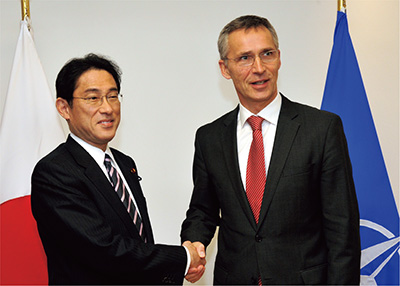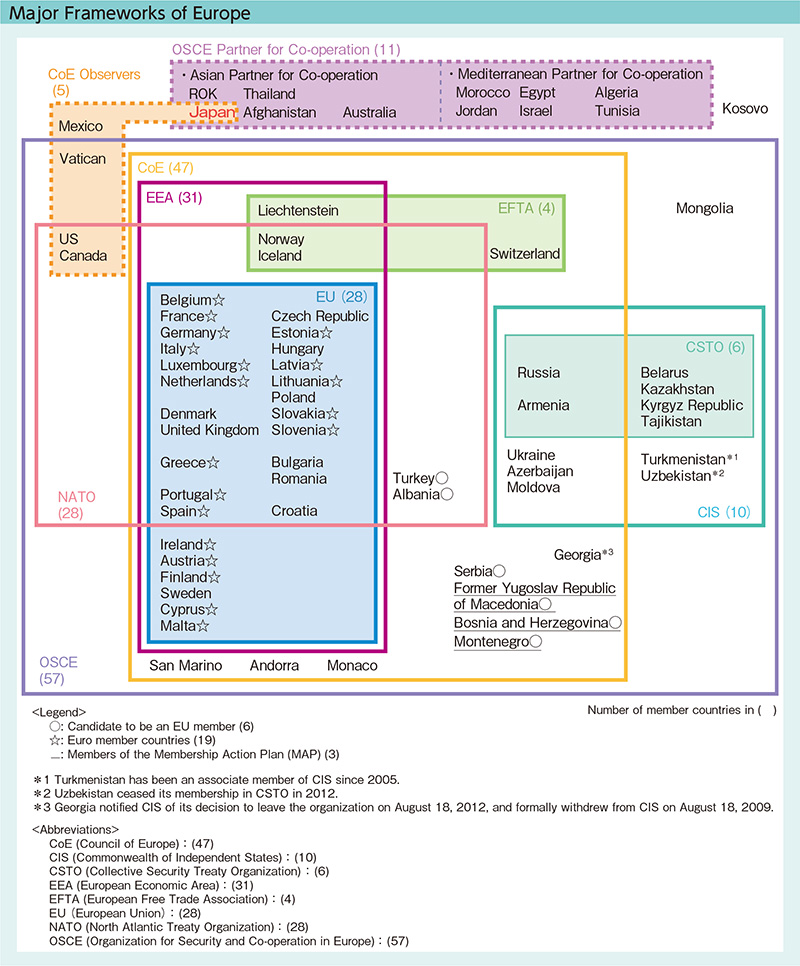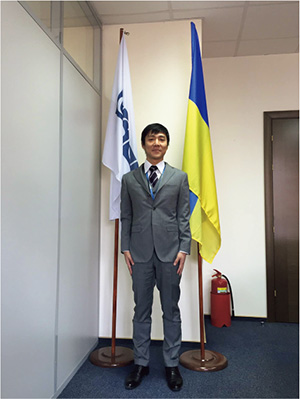Diplomatic Bluebook 2016
Chapter 2
Japan’s Foreign Policy that Takes a Panoramic Perspective of the World Map
2.Cooperation with European Regional Organizations
(1) Cooperation with the North Atlantic Treaty Organization (NATO)
NATO is a military alliance aimed at collective defense of its 28 member countries. It also works on assistance to Afghanistan, anti-piracy measures off the coast of Somalia and other crisis management, prevention of conflict and stabilization after conflict outside the area in order to eliminate direct threats to the security of the territory and people of the member countries. In Afghanistan, the International Security Assistance Force (ISAF) retreated by the end of 2014, and the Resolute Support Mission (RSM) program started with an aim to aid capacity building for the Afghan security forces from January 2015.
 Foreign Minister Kishida talking with NATO Secretary-General Stoltenberg (January 20, Belgium; NATO headquarters)
Foreign Minister Kishida talking with NATO Secretary-General Stoltenberg (January 20, Belgium; NATO headquarters)Japan and NATO are partners sharing basic values. Japan values cooperation with NATO in the context of practicing “Proactive Contribution to Peace.” In accordance with the Individual Partnership and Cooperation Program (IPCP) that was developed upon Prime Minister Abe’s visit to NATO Headquarters1 in May 2014, concrete cooperation between Japan and NATO has been promoted. Including the visit by Foreign Minister Kishida to NATO in January 2015, Japan has participated in a range of events, such as the NATO Crisis Management Exercise (CMX), Humanitarian Assistance/Disaster Relief (HA/DR) and a cyberspace related exercise as an observer. In September, NATO Deputy Secretary General Ambassador Alexander Vershbow visited Japan for a Japan-NATO Seminar to talk about the Japan-Europe security environment.
Japan also cooperates with NATO for stabilization of Afghanistan. Specifically, in addition to financial contribution to the development of Afghanistan, Japan supports activities of healthcare and education for the Afghanistan National Army (ANA) through contribution to the NATO ANA Trust Fund. Japan also contributes to disposal of unexploded bomb in Azerbaijan through the NATO Partnership for Peace (PfP).
- 1 In January 2007, Prime Minister Abe visited NATO headquarters for the first time as a Japanese prime minister; this is the second visit by a Japanese prime minister.
(2) Cooperation with the Organization for Security and Co-operation in Europe (OSCE)
OSCE, which has 57 member countries from Europe, Central Asia and North America, is a regional security organization that aims to prevent conflicts and build confidence in the region through a comprehensive approach. Japan has been involved in OSCE activities as an “Asian Partner for Co-operation” since 1992. OSCE has been playing an important role for stabilization of the situation in Ukraine. Japan financially supports the OSCE Special Monitoring Mission (SMM) and has dispatched an expert to the SMM since August 2015. In December, State Minister for Foreign Affairs Yoji Muto attended the Foreign Ministers’ meeting held in Belgrade (Serbia), where he stated that the security environment of Europe and Asia is indivisible. He also mentioned the importance of compliance with the basic principles of the Helsinki Final Act, the current situations of Ukraine and the East and South China Seas, and response to them and issued of terrorism, and refugees. Under the “Proactive Contribution to Peace” based on the principle of international cooperation, he expressed a firm determination to work with OSCE and member states for the peace and stability of the international community. Japan also supports other OSCE activities including terrorism prevention by strengthening border management through contribution to Border Management Staff College2 and support to female entrepreneurs in Central Asia.

- 2 Border Management Staff College (BMSC) provides training and education related to the latest concerns about border management, especially a comprehensive approach to safety, democratization reforms, and measures against trans-border threats to border management staff from OSCE members and partner countries.
(3) Cooperation with the Council of Europe (CoE)
CoE is a regional organization of 47 member countries and fulfills an important role in establishing international standards in the fields of democracy, human rights and the rule of law. As the only observer from Asia, Japan makes active contributions to various activities of CoE. Japan financially supported and dispatched experts “the Octopus Conference 2015” which aims at promoting international cooperation to respond to cybercrime held in June (in Strasbourg, France). Japan also dispatched an expert to the fourth “World Forum for Democracy” (in Strasbourg) held in November.
A green breadbasket of wheat fields stretching as far as the horizon. Ukraine with such a scenery suddenly became a battlefield. Since April 2014, when the fighting started in the east of Ukraine, more than 9,000 people, including civilians, were killed and more than a million people were driven from their homes. Large-scale conflict was no longer seen after the ceasefire agreement reached in February 2015, but an unpredictable situation still continues with fighting occurring locally and sporadically.
 At the office of the OSCE SMM
At the office of the OSCE SMMUnder such circumstances, the Organization for Security and Co-operation in Europe (OSCE) Special Monitoring Mission to Ukraine has dispatched approximately 700 civilian monitors to locations all over Ukraine, mainly to the eastern part, to monitor ceasefire regime and verify withdrawal of weapons. The Mission also facilitates adherence to the ceasefire to enable repair to essential infrastructure such as water and power supply facilities destroyed during shelling and demining of mines and unexploded ordnance.
I have been working as a reporting officer for the OSCE SMM since August 2015. The reporting officer compiles the reports from field teams in different regions of Ukraine into one report, which is a condensed version of all the reports. A report includes the status of implementation of the ceasefire agreement such as when and where shooting and shelling occurred and whether weapons has been withdrawn or not, as well as the social, economic and humanitarian situation in the conflict area, including the livelihood of residents. Daily reports, made by reporting officers, are published six times a week and available on the OSCE website. I found my work responsible and rewarding as any mistake is not allowed in my reports touching many people’s eyes.
I am the only Japanese national in the OSCE SMM. An Asian is an extremely rare presence in the OSCE where European and North American countries are participating, but I think I have been able to provide diversity to the world’s largest regional security organization, by presenting a different viewpoint. Furthermore, Japan shares with OSCE commitment such common values as the rule of law, sovereignty, and territorial integrity. In Ukraine, these values on which we had put importance so far were challenged. Such a situation is also present in Asia, where Japan is located. The situation over Ukraine is by no means a problem only in Europe, but presents an extremely important issue for the entire international community, including Asia. From this point of view, Japan is contributing toward the recovery of peace and stability in Ukraine, providing a financial support of two millilon euros to the OSCE SMM.
I hope I could do my bit for restoration of peace in the green breadbasket of wheat fields stretching as far as the horizon.

